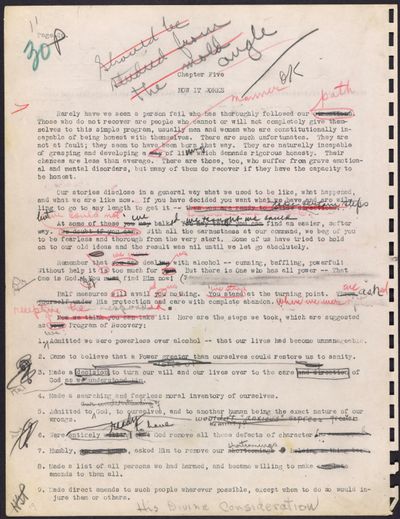Manuscript shows how AA’s bible came to be
Recently published volume offers glimpse into origins of the so-called Big Book

In 1939, about 5,000 copies of a book offering hopeless drunks a spiritual path to recovery through 12 steps was released by a fledgling fellowship of alcoholics.
They called it “Alcoholics Anonymous: The Story of How More Than One Hundred Men Have Recovered From Alcoholism.”
Sales were dismal at first, but interest picked up in 1941 with help from a story in The Saturday Evening Post and grew into a recovery revolution for everybody from over-eaters and the over-sexed to gamblers and shopaholics.
More than 27 million copies of the so-called Big Book in more than 50 languages have been sold, but little was known about how the manual where none had ever existed was conceived.
Did AA’s co-founder Bill Wilson, a fallen New York stockbroker, really write much of it himself with the help of early adherents?
Turns out the group’s bible was heavily vetted, as reflected in a working manuscript recently published for the first time.
Called “The Book That Started It All,” the document is filled with cross-outs, inserts and notes, presumably based on feedback sought from about 400 hand-picked outsiders who included doctors and psychiatrists.
Some of the edits made it into print, especially in early chapters for fragile readers. Many others were rejected as the still-anonymous personalities behind the notes fretted over how to handle God and religion, a Higher Power “bigger than ourselves” and the influence of the Oxford Group, a religious movement embraced by Wilson and his fellow founder, Ohio physician Bob Smith, but later considered a preachy hindrance in working with problem drinkers.
“The goal was to increase the likelihood that there would be fewer distractions and fewer reasons for throwing the book across the room,” said Fred Holmquist, a student of AA history and director of the Lodge Program for the treatment program Hazelden.
Hazelden’s publishing arm was given high-resolution scans of the typed manuscript by its current owner, an Alabama businessman. They show off the mysterious edits and marginalia and are being published with commentary from AA historians. The manuscript passed to Wilson’s widow, Lois, after he died in 1971 and has surfaced twice at auction since, including one sale for $1.56 million in 2004 to a California lawyer.
It’s a rare glimpse into the inner-workings of an organization that was shrouded in mystery (some early members wore face masks when speaking in public) but remains the dominant force in addiction recovery.
“The spirituality side is what enabled the movement to grow very rapidly,” said Nick Motu, a Hazelden senior vice president and head of the publishing division. “Had this been about religion, I have doubts it would have succeeded as it had.”
Founded in 1935, before addiction was truly understood as an illness, Wilson believed “you can’t tell drunks what to do. That was his genius,” said Susan Cheever, who wrote the Wilson biography “My Name is Bill.”
Wilson’s spiritual “inclusiveness,” as Cheever put it, apparently struck the right tone in a chapter for atheists and agnostics that made it through vetting with few changes. One telling sentence weighing a life in “alcoholic hell” against being “saved” was edited to say “alcoholic death” or life “on a spiritual basis.”
Some mentions of God became “God as we understood him.” In the seventh step, where Wilson and his collaborators indicate to their readers that they “Humbly asked Him to remove our shortcomings,” a reference to doing so “on our knees” was crossed out and never made it into print.
While some critics question whether AA really works for most, Cheever said Wilson would have hated the idea of forcing it down the throats of anybody, including prison inmates or court defendants, against their will.
“He understood that very well,” she said. “He said over and over and over again that never works.”